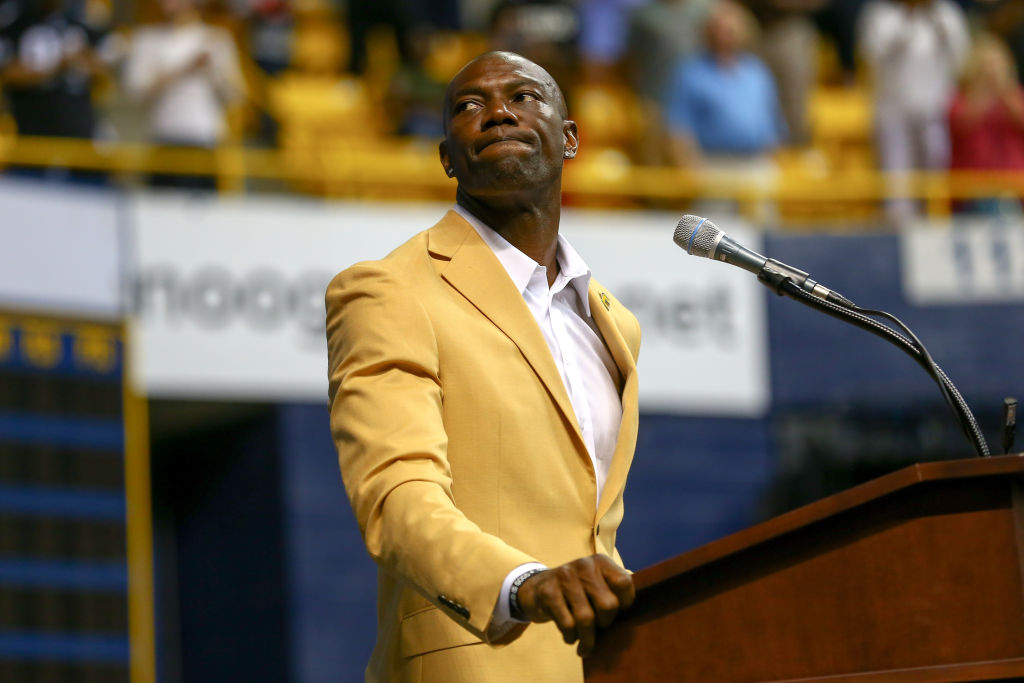NFL
Terrell Owens Did Something No One in Hall of Fame Has Ever Done

The Pro Football Hall of Fame opened its doors in Canton, Ohio, in 1963. Since that time, there have been 326 members enshrined into its hallowed halls. In 2018, when Terrell Owens was inducted, he became one of 29 wide receivers to earn the distinguished honor. Owens, who was known throughout his career for doing things his own way, did just that during his Hall of Fame induction ceremony and set himself apart from every other member in the museum’s storied history.
Terrell Owens puts up Hall of Fame-worthy numbers
In Terrell Owens’ 15 seasons in the NFL, his numbers jump off the page. Among the most notable, Owens led the league in touchdown receptions three seasons with 16 (2001), 13 (2002), and 13 (2006). In addition, Owens was the leader for longest receptions in 2005 (91 yards) and 2009 (98 yards). Those two stats combined show T.O. provided quantity and quality.
As a member of five different teams (San Francisco, Philadelphia, Dallas, Buffalo, and Cincinnati), Owens amassed 153 total touchdown catches in his career (10.2 per season), which is good for third best behind only Jerry Rice and Randy Moss—both Hall of Famers. For his career, Owens caught passes for a total of 15,934 yards, which is also third on the all-time list behind Rice, and future Hall of Famer Larry Fitzgerald.
For all his individual achievements, Owens was named a five-time All-Pro and earned six Pro Bowl nominations. The one accomplishment that eluded Owens was a Super Bowl championship. He did appear in Super Bowl XXXIX with the Philadelphia Eagles, where he defied doctors orders and played on an injured ankle and recently healed broken leg. Despite his performance that included nine receptions for 122 yards, the Eagles came up short against the New England Patriots.
Owens played his last game in 2010, making him eligible for the Hall of Fame in 2016.
Hall of Fame snubs Owens
In 2016, despite statistically being one of the top five best receivers in NFL history, the nominating committee passed over Owens his first year of eligibility.
That first-time exclusion was puzzling to many but could be explained away as others were more deserving, and Owen’s diva-like behavior during his career likely prevented him from being a first-ballot inductee. But then it happened again in 2017. An understandable backlash immediately followed, and the never-shy Owens voiced his displeasure calling it a “flawed process.”
Many in the NFL community agreed including Hall of Famer Deion Sanders. “When someone like Terrell Owens doesn’t make the Hall of Fame consecutively, that’s not good for the Hall. That’s not what we represent. I played against this guy. This guy was a man amongst boys.”
Owens’ snub in consecutive years was a black eye to the Hall of Fame, as Sanders suggested, and in 2018, the selection committee reversed course and nominated Owens to the Hall on his third try.
Owens hosts own induction ceremony
In 2018 when Owens received notification he had been nominated for induction, he experienced numerous emotions, the most significant being relief, knowing the wait was finally over. Then Owens, in typical T.O. style, stunned the NFL and the Hall of Fame when he announced he would not be attending the ceremony in Canton and instead host his own private ceremony at his alma mater, the University of Tennessee-Chattanooga.
On August 4, 2018, while fellow 2018 inductees, including Brian Urlacher, Ray Lewis, and Randy Moss, were delivering speeches in Canton, 600 miles to the south, Owens delivered his own speech to a crowd of 3,000 gathered at McKenzie Arena on the UT-Chattanooga campus.
The then-44-year-old Owens addressed why he was the first-ever Hall of Fame inductee in the almost 60-year history to not attend the ceremony in Canton.
“There’s been a lot of speculation and false reports as to why I chose not to be there. I would like to set the record straight: It’s not because how many times it took me to be voted to the Hall. It’s about the mere fact that the sportswriters are not in alignment with the mission and the core values of the Hall of Fame.”
Owens delivered an emotional 40-minute speech thanking all those in attendance as well as congratulating his fellow inductees. When it was over, Owens had received what he rightfully earned, but more importantly, he sent a clear message to the NFL and the Hall of Fame selection committee and highlighted a broken process that should operate in a manner as professional as the Hall of Fame athletes it represents.











